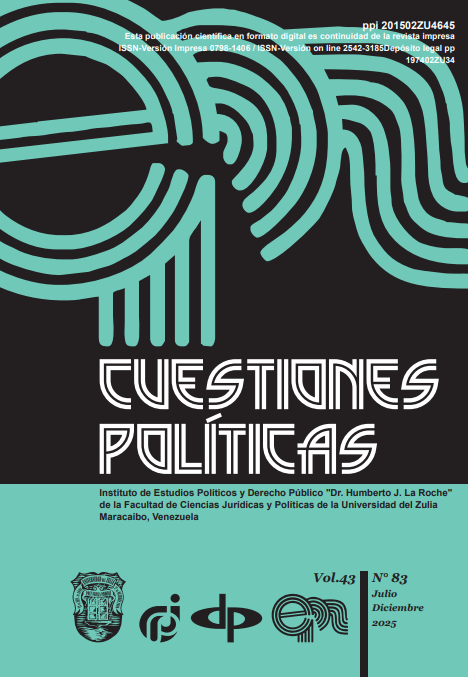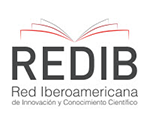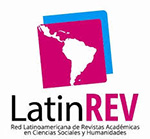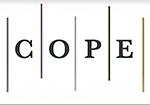Criminal liability for digital manipulation for criminal purposes: A look at comparative digital law in Latin America
Abstract
In today's world, characterized by the hegemony of technology in all areas of social life, discussing criminal liability for digital manipulation with criminal intent in Latin America involves addressing a complex theoretical and practical field that in many ways goes beyond the old lines of conventional crime and delves into the rapid development of cyberspace within the constant structure of the digital society of the 21st century. For these reasons, the objective of the research was to analyze the scope and doctrinal significance of criminal liability for digital manipulation with criminal intent from the perspective of comparative Latin American digital law. To achieve this objective, legal hermeneutics was used within the framework of comparative law methodology. The results obtained allow us to conclude that there is no single definitive answer to the question: to what extent is it possible to attribute criminal responsibility when the perpetrator of the crime hides behind algorithms and dispersed networks? Rather, doctrine is constructing, stumbling, and reinventing the bases of imputation and the legal right at stake, as real cases challenge legal frameworks that were believed to be secure.
Downloads
References
ALVARADO, Manuel. 2017. “Aspectos legales al utilizar las principales redes sociales en Colombia” En: Revista Logos, Ciencia & Tecnología. Vol. 8, No. 2, pp. 211-220. Disponible en línea. En: https://doi.org/www.redalyc.org/journal/5177/517752177019/html. Fecha de consulta: 14 de marzo de 2024.
ASAMBLEA NACIONAL DE LA REPUBLICA DE ECUADOR. 2014. Código Orgánico Integral Penal, COIP. Disponible en línea. En: https://www.defensa.gob.ec/wp-content/uploads/downloads/2021/03/COIP_act_feb-2021.pdf. Fecha de consulta: 10 de febrero de 2025.
BOTERO, Andrés. 2015. “La metodología documental en la investigación jurídica: alcances y perspectivas” En: Revista Opinión Jurídica. Vol. 2, No. 4, pp. 109-116. Disponible en línea. En: https://revistas.udem.edu.co/index.php/opinion/article/view/1350/1373. Fecha de consulta: 18 de abril de 2025.
CÁMARA DE DIPUTADOS DEL H. CONGRESO DE LA UNIÓN. 2025. Código Penal Federal. Disponible en línea. En: https://www.diputados.gob.mx/LeyesBiblio/pdf/CPF.pdf. Fecha de consulta: 7 de julio de 2024.
DEVIA, Edmundo. 2017. “Delito Informático: Estafa Informática del Artículo 248.2 del Código Penal” En: Universidad de Sevilla. Disponible en línea. En: https://idus.us.es/server/api/core/bitstreams/885069f5-7725-4bd9-858f-3320feb75da1/content. Fecha de consulta: 18 de abril de 2025.
EL CONGRESO DE COLOMBIA. 2000. Ley 599 de 2000 por la cual se expide el Código Penal. Disponible en línea. En: https://www.oas.org/dil/esp/codigo_penal_colombia.pdf. Fecha de consulta: 24 de julio de 2024.
EL CONGRESO DE COLOMBIA. 2009. LEY 1273 DE 2009. Disponible en línea. En: https://www.funcionpublica.gov.co/eva/gestornormativo/norma.php?i=34492. Fecha de consulta: 5 de enero de 2025.
ESLAVA-ZAPATA, Rolando; ROJAS-HERMIDA, Carlos; GARCÍA-PEÑALOZA, John. 2024. “Variables asociadas a los delitos informáticos en Latinoamérica” En: Revista Academia & Derecho. Vol. 15, No. 28, pp. 1-21. Disponible en línea. En: https://doi.org/10.18041/2215-8944/academia.28.11822. Fecha de consulta: 5 de enero de 2025.
FERNÁNDEZ, Eder; DÍAZ, José. 2022. Los derechos digitales: ¿hacia una nueva generación de derechos humanos? Aproximaciones teóricas desde América Latina y Europa” En: Direito, Estado e Sociedad. No. 61, pp. 80-105. Disponible en línea. En: https://revistades.jur.puc-rio.br/index.php/revistades/article/view/1942/727. Fecha de consulta: 15 de marzo de 2025.
LA ASAMBLEA NACIONAL DE LA REPÚBLICA BOLIVARIANA DE VENEZUELA. 2001. Ley Especial Contra los Delitos Informáticos. Disponible en línea. En: https://www.oas.org/juridico/spanish/mesicic3_ven_anexo18.pdf. Fecha de consulta: 15 de marzo de 2025.
LA ASAMBLEA NACIONAL DE LA REPÚBLICA BOLIVARIANA DE VENEZUELA. 2013. Ley de Infogobierno. Disponible en línea. En: http://www.ucv.ve/fileadmin/user_upload/facultad_farmacia/Documentos/leyinfog.pdf. Fecha de consulta: 10 de octubre de 2024.
MAYER, Laura. 2017. “El bien jurídico protegido en los delitos informáticos” En: Revista Chilena de Derecho. Vol. 44, No. 1, pp. 235-260. Disponible en línea. En: https://www.scielo.cl/pdf/rchilder/v44n1/art11.pdf. Fecha de consulta: 10 de octubre de 2024.
MAYER, Laura; OLIVER, Guillermo. 2020. “El delito de fraude informático: Concepto y delimitación” En: Revista chilena de derecho y tecnología. Vol. 9, No. 1, pp. 151-184. Disponible en línea. En: https://www.scielo.cl/pdf/rchdt/v9n1/0719-2584-rchdt-9-1-00151.pdf. Fecha de consulta: 25 de enero de 2025.
MORÁN, Alejandra. 2020. “Responsabilidad penal de la Inteligencia Artificial (IA). ¿La próxima frontera?” En: Revista del Instituto de Ciencias Jurídicas de Puebla. Vol. 15, No. 48, pp. 290-323. Disponible en línea. En: https://revistaius.com/index.php/ius/article/view/706/795. Fecha de consulta: 25 de enero de 2025.
PÉREZ, Jacinto. 2021. “Cibercriminalidad: Hacia la nueva realidad -virtual- del derecho penal” En: Revista internacional de doctrina y jurisprudencia. No. 26, pp. 175-193. Disponible en línea. En: https://ojs.ual.es/ojs/index.php/RIDJ/article/view/7063/5890. Fecha de consulta: 12 de marzo de 2025.
PRESIDENTE DE LA REPÚBLICA DEL PERÚ. 2014. Ley de Delitos Informáticos No. 30096. Disponible en línea. En: https://www2.congreso.gob.pe/sicr/cendocbib/con5_uibd.nsf/C5F98BB564E5CCCF05258316006064AB/$FILE/6_Ley_30096.pdf. Fecha de consulta: 10 de marzo de 2025.
SARMIENTO-CHAMBA, Jose; Maldonado-Ruiz, Luis. 2024. “Delitos informáticos y ciberataques: análisis jurídico en el derecho penal del Ecuador’ En: MQRInvestigar. Vol. 8, No. 3, pp. 1753-1781. Disponible en línea. En: https://doi.org/10.56048/MQR20225.8.3.2024.1753-1781. Fecha de consulta: 14 de abril de 2025.
SOMMA, Alessandro. 2015. Introducción al Derecho comparado. Editorial Committee. Madrid, España. Disponible en línea. En: https://doi.org/https://www.corteidh.or.cr/tablas/r34961.pdf. Fecha de consulta: 14 de febrero de 2025.
Copyright
The authors who publish in this journal agree to the following terms:
The authors retain the copyright and guarantee the journal the right to be the first publication where the article is presented, which is published under a Creative Commons Attribution License, which allows others to share the work prior to the recognition of the authorship of the article work and initial publication in this journal.
Authors may separately establish additional agreements for the non-exclusive distribution of the version of the work published in the journal (for example, placing it in an institutional repository or publishing it in a book), with an acknowledgment of its initial publication in this journal.
This work is under license:
Creative Commons Reconocimiento-NoComercial-CompartirIgual 4.0 Internacional (CC BY-NC-SA 4.0)






































